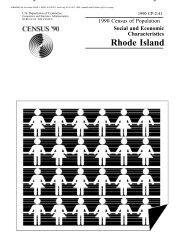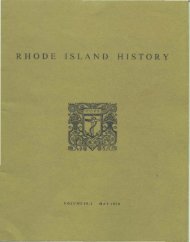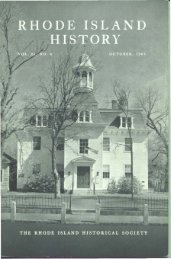Untitled - Rhode Island Historical Society
Untitled - Rhode Island Historical Society
Untitled - Rhode Island Historical Society
You also want an ePaper? Increase the reach of your titles
YUMPU automatically turns print PDFs into web optimized ePapers that Google loves.
Notes continued<br />
picket on the evening of 25 November. Smith,<br />
Fight for the Delaware,40. The jaeger picket<br />
lost twenty-five men killed and wounded and<br />
twelve prisoners in this action. William<br />
Haslewood, "Journal of a British Officer during<br />
the American Revolution," ed. Louise<br />
Phelps Kellogg, Missksippi Valley Hktorical<br />
ReviewT, no. 1 (June 1920): 58. For Nathanael<br />
Greene's 26 November report of it to<br />
Washington, see Greene Papers, 2:218- 19.<br />
65. Maidenhead is in Hunterdon Counry<br />
66. Joseph Read, ofNorthampton (now<br />
Allentown), Pa., was a lawyer rvho had served<br />
in the Provincial Congress.<br />
67. Robert Helms, who had resigned his commission<br />
the previous day; 2nd Lt. Abel Carpenter.<br />
Heitman, <strong>Historical</strong> Register, 145, 284.<br />
68. I.e., Parson Ebenezer David.<br />
69. The British foray into New Jersey had gained<br />
"300 head of fat Cattle and 1000 Sheep."<br />
Haslewood, "Journal," 58.<br />
70. Angell's regiment crossed to Pennsylvania on<br />
28 November and joined Washington's army<br />
at \Vhite Marsh, about fourteen miles northwest<br />
of Philadelphia and some twenty miles<br />
from Bristol, hvo days 1ater. Angell stayed<br />
behind in New lersey to tend the baggage and<br />
did not rejoin the regiment until 2 December.<br />
Greenman, Diary,87.<br />
71. Ancocus (now Rancocus) Creek is in<br />
Burlington County.<br />
72. Howe's army had marched out of Philadelphia<br />
at ten o'clock the previous night in an attempt<br />
to catch the Americans off guard at \\4rite<br />
Marsh. Instead, it found strong, alertly manned<br />
lines of defense. The two forces skirmished<br />
for several days, but neither rvished to risk a<br />
major battle. The British marched back into<br />
Philadelphia on 8 December. Iohn Reed,<br />
Campaign to Vallef Forge: JuIy 1, 1777-<br />
December 19, 1777 (.Phrladelphia: Pioneer<br />
Press, 1980), 363-80.<br />
73. Robertson claimed that Morgan was "immediately<br />
Drove off with a good deal of Loss"<br />
but admitted that the British lost about forty-<br />
three men. D)aries,160. Morgan gave his losses<br />
as twenty-seven killed and wounded.<br />
Washington to the President of Congress, 10<br />
Dec. 1777 , Writings, I0:I43-44.In his general<br />
orders for 8 December, Washington offered<br />
"his rvarmest thanks to Col. Morgan, and the<br />
officers and men of his intrepid corps, for<br />
their gallant behavior!' Writings, 10:140.<br />
74. The report about Col. Charles Webb, of the<br />
Second Connecticut Regiment, was incorrect;<br />
he was not captured. Heitman, <strong>Historical</strong><br />
Register, 577 . Brig. Gen. lames Irvine, of the<br />
Pennsylvania Militia, remained a prisoner until<br />
iune 1781. Ibid.,314. British losses on 7<br />
t36 THE ]SRAEL ANGELL DIARY, I OCTOBER 1777-28 FEBRUARY 1778<br />
December were eighty-nine killed and<br />
wounded. General Howe reconnoitered the<br />
American position but found the natural and<br />
man-made obstacles so strong that they"prevented<br />
any hope of success." Muenchhausen,<br />
At Ceneral Howe s Side, 45.<br />
75. The British began their march at noon on this<br />
76.<br />
77.<br />
day and were in Philadelphia by eleven<br />
o'clock that night. Muenchhatsen, At Howe's<br />
Side,45.<br />
See "Diary of Surgeon Albigence Waldo," 304.<br />
Ebenezer David was less detailed about the<br />
devastation: "to see the ruins of furniture . . .<br />
was truly effecting-A Cow Horse or sheep<br />
was scarce to be seen for miles." David to<br />
Nicholas Brown, 22 Dec. 1777, <strong>Rhode</strong> <strong>Island</strong><br />
Chaplain,73.<br />
78. This was at Matson's Ford, near the Gulph, in<br />
Montgomery County.<br />
79. British troops under Lord Cornwallis, on a<br />
foraging expedition, pushed back Gen. lames<br />
Potter's Pennsylvania Militia, who "behaved<br />
with bravery and gave them every possible<br />
opposition." Some of Washington's men had<br />
crossed the river, but they returned when they<br />
found themselves greatly outnumbered by the<br />
enemy. Washington to Henry Laurens, 14 Dec.<br />
1777, Writings, i0:156; I. Laurens to H.<br />
Laurens, 23 Dec.1777, Correspondence of<br />
Colonel John Laurens, 95.<br />
80. "Our ancient bridge, an infamous construction<br />
which in many parts obliged the men to<br />
march by Indian file, was restored, and a<br />
bridge ofwaggons made over the Swedes<br />
Ford, but fence-rails from necessity being<br />
substituted to plan, and furnishing a very<br />
unstable footing, this last served to cross a trifling<br />
number of troops." J. Laurens to H.<br />
Laurens, 23 Dec. 1777, Correspondente of<br />
Colonel Iohn Laurens,96-97 .<br />
81. The army had arrived at the Gulph-identified<br />
by Washington as a defile leading to the<br />
Schuylkill River-where it remained until 19<br />
December. Washington to the President of<br />
Congress, 14 Dec. 1.777, Writings, 10:156.<br />
82. Another officer reported that the British were<br />
close and had "Carried off some Liquers from<br />
a Tavern." Revolutionary War lournals of<br />
Henry Dearborn, 1775-1783, ed. Lloyd A.<br />
Brown and Howard H. Peckham (Chicago:<br />
Caxton Club, 1939), l18.<br />
83. Charles Holden and Griffin Greene, paymasters<br />
respectir.ely of the Second and First<br />
<strong>Rhode</strong> <strong>Island</strong> Regiments. Heitman, <strong>Historical</strong><br />
Regkte4 295,260.<br />
84. On 1 November the Continental Congress set<br />
18 December as a day "for solemn thanksgiving<br />
and praise" in recognition of the "most<br />
signal success"-the victory at Saratoga.<br />
Journals of the Continental Congress, g:S,;i i:<br />
Food supplies were very low and condition'<br />
were poor, prompting Major Dearborn to<br />
write, "all we have to be thankful for is that<br />
we are alive & not in the grave." Dearborn.<br />
Journak,118.<br />
85. Lt. Samuel Armstrong of the Eighth<br />
Massachusett> Regiment was more appreciative<br />
of the weather: "The sun shone out this<br />
morning being the first I had seen it for 7 dars<br />
which serv'd to put new Life into everlthing.'-<br />
Samuel Armstrong, Diary, New England<br />
Historic Genealogical Sociery Boston.<br />
86. On this day the army marched to Valley<br />
Forge. Scattered farmhouses rvere the only<br />
available shelter there.<br />
87. Greenman records that ten acres of corn lyas<br />
gathered in five minutes, and some of it<br />
cooked. Dlary, 88.<br />
88. Provisions were very short during this time;<br />
"unless some great and capital change suddenly<br />
take place," said Washington, ". . . this<br />
Army must . . . Starve, dissolve or disperse, in<br />
order to obtain subsistence." Washington to<br />
Henry Laurens, 23 Dec. 1777, Writings,<br />
10:192. Moreover, the quality of the army's<br />
provisions was extremely poor. A committee<br />
of three captains, appointed by Gen. Johann<br />
De Kalb, inspected the fresh meat issued to<br />
Learned's Brigade on 20 December "and judged<br />
it not wholesome to eat. Report was made to<br />
the gen1," who ordered that salt provisions be<br />
served out instead. Armstrong, Diary.<br />
89. A large detachment from Howe's army, numbering<br />
eight thousand men, had marched<br />
from Philadelphia to forage in the area of<br />
Darby Creek, west of the city. To oppose<br />
them, Washington sent Lord Stirling's division<br />
on 23 December. (Lord Stirling was Maj. Gen.<br />
William Alexander; he was known to his<br />
American contemporaries as Lord Stirling in<br />
consequence of his unsuccessful claim to the<br />
earldom of Stirling in Scotland. Mark Mayo<br />
Boatner III, Encyclopedia ofthe American<br />
Reyolution, Bicentennial Edition INew York:<br />
David McKay Co ,, 19741,16,) Because of supply<br />
problems, the Americans could detach<br />
only part of their forces to limit British foraging.<br />
The British returned to Philadelphia on<br />
28 December. |. Laurens to H. Laurens, 23<br />
Dec. 1777, Correspondence of Colonel lohn<br />
Laurens,97 -98.<br />
90. Washington's general orders of 18 December<br />
required the troops to be divided into tlvelveman<br />
squads to build log huts, each fourteen<br />
by sixteen feet. Writings, 10:170171.<br />
91. A few days earlier the governor ofNew |ersey<br />
had written to the president of Congress informing<br />
him that the patients in the<br />
Princeton hospital "were destitute of many<br />
Articles absoltely Isic] necessary for Persons in











